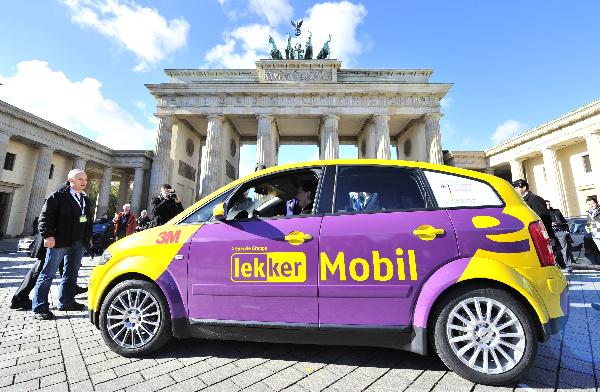 The chief executive of DBM Energy, Mr. Mirko Hannemann gets out of the “Lekker Mobil”, an Audi A2 with an electric engine. The distance between Munich in southern Germany to Berlin about 600km was covered without recharging battery, setting a new world distance record for an everyday vehicle.
The chief executive of DBM Energy, Mr. Mirko Hannemann gets out of the “Lekker Mobil”, an Audi A2 with an electric engine. The distance between Munich in southern Germany to Berlin about 600km was covered without recharging battery, setting a new world distance record for an everyday vehicle.
The yellow and purple Audi A2 car took around seven hours to complete the 600-kilometre (372-mile) stretch and arrived in the sumptuous courtyard of the economy ministry in Berlin just before 8:00am local time (06:00 GMT).
“If any journalists want to charge up their iPhones, we still have some electricity left,” quipped driver Mirko Hannemann, 27 years old, as he stepped out of the four-door car to show off the battery which uses DBM Energy’s KOLIBRI AlphaPolymer Technology said to be 97 percent efficient and chargeable from virtually any socket — plug it into a high voltage DC source and it can be fully charged in just six minutes according to the car’s driver and battery inventor, Mirko Hannemann. Car manufacturers hope that electric cars will grow to dominate the automotive industry but consumers see the short range of the vehicles as a major downside.
Economy Minister Rainer Bruederle welcomed the team on arrival and was even tempted into taking a spin around the courtyard, although not behind the wheel. “They even had the heating on. It really was a luxury journey,” Bruederle told a large crowd of journalists and photographers on a chilly Berlin morning. At a later press conference, Bruederle said: “Welcome to a world record. Before, electric cars could typically only go 60 or 70 kilometres before recharging. This is a technological leap forward.”
Japanese researchers have driven an experimental electric car more than 1,000 kilometres around a track, but the two German firms, Lekker Energie and DBM Energy, said their vehicle was the furthest travelled by an everyday car.
Chancellor Angela Merkel’s government aims to have one million electric cars on the road by 2020, but Germany’s car giants have been slow off the starting grid and are now scrambling to catch up with their Asian rivals.
World-leading luxury car maker BMW and Europe’s biggest manufacturer Volkswagen have both said they intend to launch their first electric vehicles in 2013.
In contrast, last week, Japan’s Nissan said it had started mass producing its Leaf electric car and is poised to put it on sale both at home and in the United States.
Nevertheless, Berlin has offered sweeteners to jump-start its national champions and hopes that by 2050, gas-guzzlers could be a thing of the past. “Let the message go out to the world. Germany is again a technological leader,” said Bruederle.




nice site, very insightful. I like it a lot. I come acoss this article by google search engine. I could read your site daily and share it to my neibourghhood. Please keep it fresh. Keep on the good work. – A hockey fun